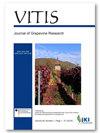Fruitfulness in grape-vines: The response of different cultivars to light, temperature and daylength
IF 1.1
4区 农林科学
Q3 HORTICULTURE
引用次数: 66
Abstract
Plants of five cultivars (Sultana, syn. Thompson Seedless; Muscat Gordo Blanco; Rhine Riesling; Shiraz; and Ohanez) of grape-vine (Vitis vinifera L.) were grown for 13 weeks in controlled environment growth cabinets, and then the number of bunch primordia present in buds was counted after dissection. Sultana (S) and Ohanez (0) had very few bunch primordia under all conditions. Of the other cultivars all were barren after growth at 15° C, but Rhine Riesling (R) and Shira". (Sh) had some primordia at 20° C, and Gordo (G) at 25° C. Primordia number of R, Sh and G increased with increase in temperature up to approximately 35° C. R had most at all temperatures. At a light intensity of 900 foot candles (f. c.) R had some primordia, but other cultivars were barren. At 1800 f. c. both R and G had a moderate number of primordia, but Sh was barren. At 3600 f. c. R, G and Sh all had fruitful buds. R had the greatest number of primordia at each intensity. R and Sh had more primordia when 16 hours of light per day were given continuously than when in two portions separated by 4-hour dark periods. S and O produced very few bunch primordia under any of the conditions tested. Evidence is presented that this result was due to a later differentiation of bunch primordia in buds of these cultivars, such that primordia were still unrecognisable at 13 weeks. Of the other cultivars, R had more primordia at all temperatures and light intensities; each cultivar performed well at high temperature and light intensity, but only R performed well under poor conditions.葡萄的结实性:不同品种对光、温度和日照长度的反应
五个栽培品种的植物(Sultana, syn. Thompson)无籽;马斯喀特戈多布兰科;莱茵雷司令;设拉子;以葡萄(Vitis vinifera L.)为材料,在受控环境的生长柜中培养13周,解剖后统计芽中存在的束原基数量。Sultana (S)和Ohanez(0)在所有条件下都很少有束原基。除莱茵雷司令(rine Riesling)和西拉(Shira)外,其他品种在15°C下生长后均不育。(Sh)在20℃时有一些原基,(G)在25℃时有一些原基,R、Sh和G的原基数量随着温度的升高而增加,直到35℃左右,R在所有温度下都最多。在900英尺蜡烛(摄氏)的光强度下。R有一些原基,但其他品种是不育的。在1800摄氏度时,R和G都有中等数量的原基,但Sh是贫瘠的。在3600华氏度时,R、G和Sh都有了丰硕的芽。在各强度下,R的原基数量最多。R和Sh在每天连续光照16小时的情况下,比在间隔4小时黑暗期的两组中有更多的原基。S和O在任何测试条件下都很少产生束原基。有证据表明,这一结果是由于这些品种的芽中束原基的分化较晚,因此在13周时原基仍然无法识别。在所有温度和光照条件下,R的原基含量均高于其他品种;各品种在高温光强条件下均表现良好,但只有R品种在恶劣条件下表现良好。
本文章由计算机程序翻译,如有差异,请以英文原文为准。
求助全文
约1分钟内获得全文
求助全文
来源期刊

Vitis
农林科学-园艺
CiteScore
1.80
自引率
0.00%
发文量
0
审稿时长
>36 weeks
期刊介绍:
VITIS publishes original scientific papers and critical reviews concerning grapevine biology, molecular biology, breeding, plant pathology, oenology and related fields. Research with a focus on pharmacology or post-harvest technology is not suitable for publication in VITIS.
 求助内容:
求助内容: 应助结果提醒方式:
应助结果提醒方式:


